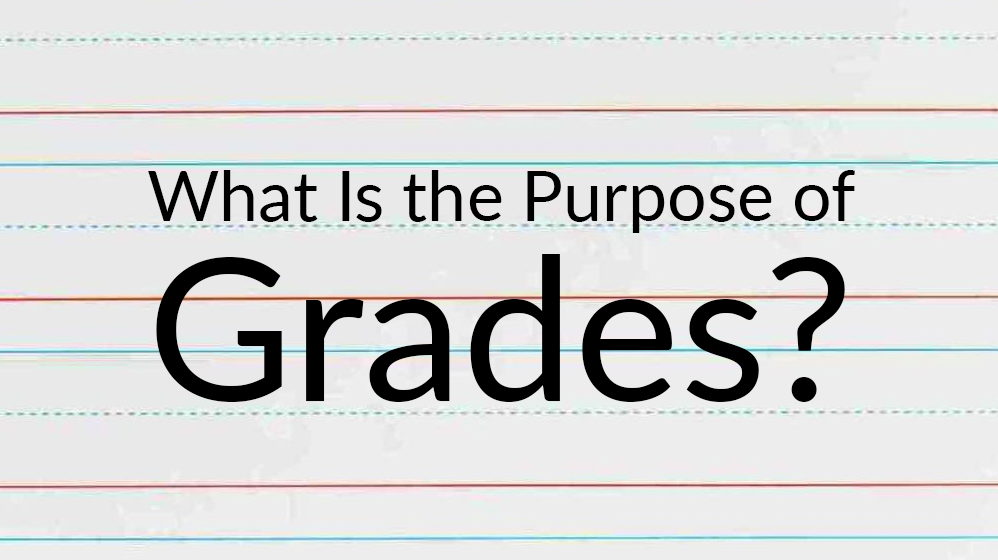When we ask educators, “What is the purpose of grades?” We receive a wide variety of answers, including: “so I know how well my students understand the standards,” “so my students and their parents know how well they are doing in my class,” and the answer that frustrates us the most, “to motivate my students.” When we ask students the same question, the responses are very different. Many students feel grades are very subjective and not a true depiction of their ability and knowledge.
Education has existed, either formally or informally, since the dawn of man. Teaching and learning and the transmission of knowledge from one person to another are fundamental to existing as a human being (Strauss, Siv, & Stein, 2002). The act of informally assessing students through discourse can be traced back to the teachings of Socrates (Nelson & Dawson, 2014). Tocci (2010) chronicled the history of grades, stating that in the 17th Century, universities awarded degrees based solely on students’ public presentation of knowledge and up-and-down votes cast by leaders of the college. Grades for students were first reported at Yale University in 1785, then quantified into an empirical scale (1-4) in 1813. Harvard adopted this system in the 1830s, shifting to a 1-100 scale shortly after.

Most educators agree on the positive effects of quality formative assessment. Assessments are formative when the information gained is used to adapt teaching strategies to best affect student learning (Black & Wiliam, 2018). Barton (2018) stated, “teaching without formative assessment is like teaching with your eyes closed” (p. 34). The formative assessment process should gain information used to improve instruction to better meet the needs of the students (Popham, 2006).
Alternatively, formative feedback, as defined by Schute (2008), is “information communicated to the learner that is intended to modify his or her thinking or behavior for the purpose of improving learning” (p. 154). Formative feedback needs to be provided to the student in time to be used to improve understanding of the learning target as well as provide the student with understanding of the next steps to improve learning (Moss & Brookhart, 2009).
Butler (1987) found that students are motivated by receiving quality feedback on an assessment, rather than a grade. In fact, when no feedback is provided by the teacher to the student, the student’s motivation is negatively affected and their desire to participate in future assessments is diminished. The presence of a numeric grade on an assessment causes students to disregard the feedback and focus solely on the numeric score (Irons, 2008). Thus, student learning is most positively impacted when students are provided meaningful feedback on an assessment without a grade attached (Nyquist, 2003). Students, ultimately, only see relevance in feedback when provided opportunities for reassessment (Havnes et al., 2012).

A few years back we began to question why we were using a grading system developed hundreds of years ago and whether it was still appropriate in our ever-changing society and our transition to project-based learning. Our teacher leaders, including Claire, developed a school-wide proficiency-based grading system using rubrics, a 1-4 scale, and only summative assessments. Most of our staff was satisfied that we were meeting the needs of our students and fostering student academic growth and motivation through reassessment opportunities and a focus on formative assessment feedback without grades.
Claire noticed when speaking with her students and representatives on our Student Advisory Board, that there was still a disconnect in student perceptions of grades at our school. The students felt their grades were subjective and not solely based on their ability level. There was also a disconnect between the formative feedback they were receiving and their summative grades. After some extensive research and discussion, we agreed to test the idea of “ungrading” (Kohn & Blum, 2020) in Claire’s classes during the 2021-22 school year.
In an “ungraded” classroom, students are assessed on whether or not they know the content. Students work on projects, participate in practice tasks, and engage in activities to learn the content. Students are given ongoing feedback to guide their learning. They use that feedback to refine tasks until they are able to show proficiency. A record of which standards they have shown to be proficient in is kept and the student and teacher decide together whether they are emergent, developing, proficient, or exemplary for that grading period based on the expected learning, not the average score given to represent learning.
Many of our colleagues and teammates questioned whether students would be motivated to complete assignments if they were not earning a specific grade on that assignment. The feedback from Claire’s students verifies the positive effect of the ungrading model. One student stated, “I learned that an ungraded classroom causes me to put a lot of effort in because it is based on if I try and how much I accomplish rather than getting the average grade I earned in every assignment. In my other classes, I can (not saying I do) miss other assignments, but the other assignments are good enough for an A. In here, I have to do all of the work in order to get the A since it is based on something else.” When asked, “What did you learn about your own learning after being in an ungraded classroom?” one student responded, “I learned that one assignment doesn’t sum up who I am as a student, because I can work hard and do better next time.”
On March 22 & 29, 2022, Claire facilitated a very thought-provoking 2-part Twitter chat (#LeadK12chat(Open Link in new tab)) around the idea of grading. She posed the questions with regards to her students’ comments: Shouldn’t this be our ultimate goal as educators? Shouldn’t we strive to motivate our students to want to “work hard to do better next time?” Does our traditional grading system encourage this type of student thinking?
References
Barton, C. (2018). On formative assessment in math: How diagnostic questions can help. American Educator, 42(2), 33-43.
Black, P. J., & Wiliam, D. (2018). Classroom assessment and pedagogy. Assessment in Education: Principles, Policy & Practice, 25(6), 551-575.
Butler, R. (1987). Task-involving and ego-involving properties of evaluation: Effects of different feedback conditions on motivational perceptions, interest, and performance. Journal Of Educational Psychology, 79(4), 474-482.
Havnes, A., Smith, K., Dysthe, O., & Ludvigsen, K. (2012). Formative assessment and feedback: Making learning visible. Studies in Educational Evaluation, 38(1), 21-27.
Irons, A. (2008). Enhancing learning through formative assessment and feedback. Routledge.
Kohn, A., & Blum, S.D. (2020). Ungrading: Why Rating Students Undermines Learning (and What to Do Instead). (First edition. ed.). West Virginia University Press.
Moss, C. M., & Brookhart, S. M. (2009). Advancing formative assessment in every classroom: A guide for instructional leaders. ASCD.
Nelson, R., & Dawson, P. (2014). A contribution to the history of assessment: How a conversation simulator redeems Socratic method. Assessment & Evaluation In Higher Education, 39(2), 195-204.
Nyquist, J. B. (2003). The benefits of reconstruing feedback as a larger system of formative assessment: A meta-analysis [Unpublished master’s thesis]. Vanderbilt University.
Popham, W. J. (2006). Defining and enhancing formative assessment. Council of Chief State School Officers.
Schute, V. J. (2008). Focus on formative feedback. Review of Educational Research, 78(1), 153-189.
Strauss, S., Ziv, M., & Stein, A. (2002). Teaching as a natural cognition and its relations to preschoolers’ developing theory of mind. Cognitive Development, 17(3-4), 1473-1487.
Tocci, C. (2010). An immanent machine: Reconsidering grades, historical and present. Educational Philosophy and Theory, 42(7), 762-778.
Recommended Reads:
The Power of Feedback in the Form of Questions
Monday Mixers: The Unique Way We Are Practicing SEL at My School
 About the Co-Author | Claire Romzek
About the Co-Author | Claire Romzek
Claire was recently named 2022 Magnet Schools of America Teacher of the Year for Western States. She is a Computer Science teacher at Lied STEM Academy in Las Vegas, NV who seeks out leadership opportunities within the school. Mrs. Romzek is passionate about Project-based Learning and Proficiency-based Grading. As a mother of three, her children’s experiences in school drive her vision for change.
Mrs. Romzek earned her Bachelor’s degree from Aquinas College and her Master’s in Technology in Education from Lesley University.
Follow Claire on twitter here.(Open Link in new tab)







